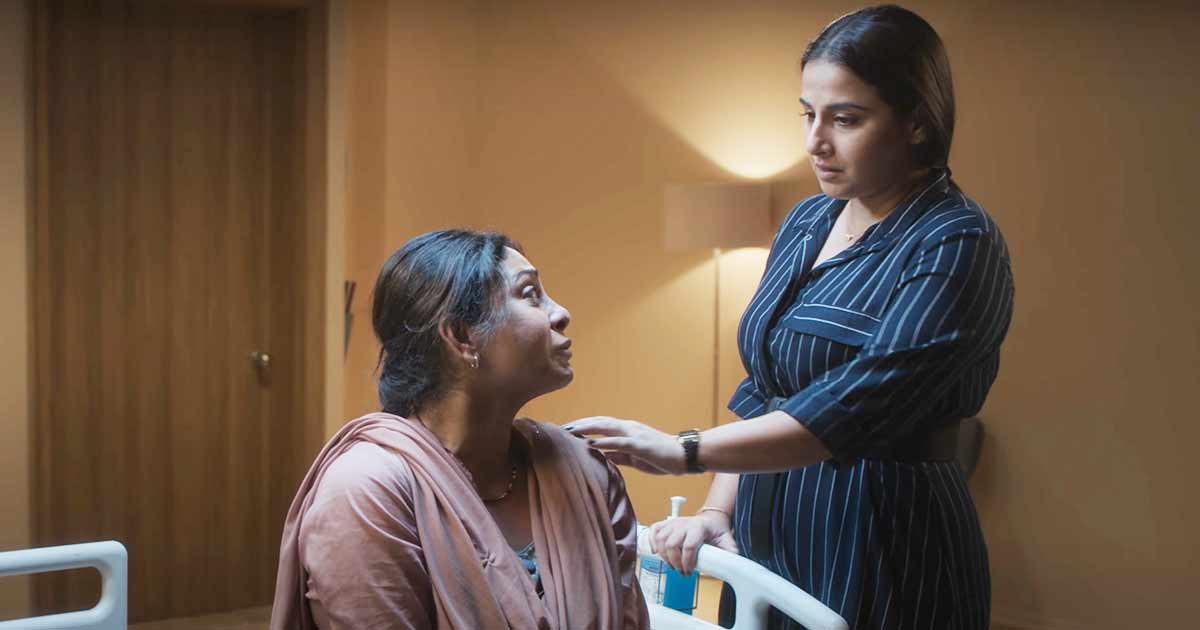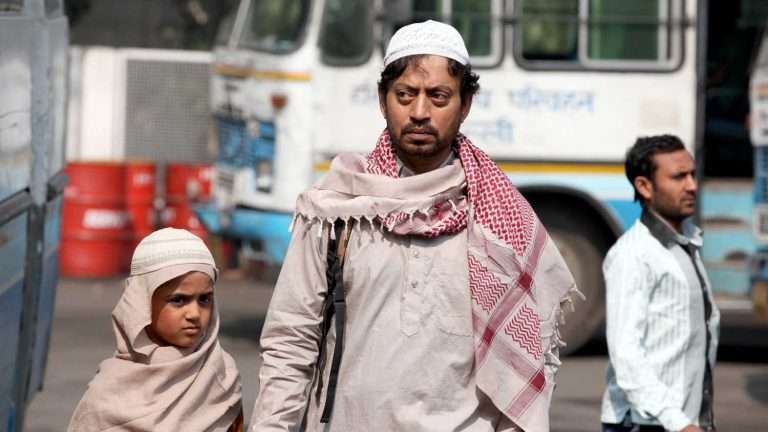In one of the first scenes, we hear Maya Menon preach to her viewers on the web that answers can be silent, but questions must always be asked. It is one of our first cues into approaching this movie, Jalsa, directed by Suresh Triveni, that tries to address too many issues in 128 minutes, albeit not unsuccessfully.
The film begins with a hit-and-run accident. A 19-year-old girl named Alia is the victim, who is left injured to die on the road while the perpetrator flees the scene. As the plot unravels, the accident weaves together the threads of Maya (played by Vidya Balan) and Ruksana’s (played by Shefali Shah) work and personal lives. The story is not uncommon unless the subplots come in and problematize the main narrative – a commendable feat achieved by the writers, Prajwal Chandrasekhar, Abbas Dalal, and Hussain Dalal – especially with the portrayal of the police officers involved in the case.
When the film was ultimately drawing towards closure, I sat up in anticipation of the unthinkable, the murky cloudiness of a rainy Mumbai serving as the perfect backdrop for the finale. How exactly does the ‘jalsa’, an assembly for entertainment, play into the narrative? How I wish directors in Bollywood left some answers unattended to for the audience to work their brains over. Yet, the emotional reality of the narrative is hard-hitting enough to let you forgo the wrong done to your imagination in these last few scenes.
Related to Jalsa – Shiva Baby (2021): The Resonant Desperation of Youthful Dissonance
It is quite unbelievable that Maya is a journalist and lives as affluently as shown in this film. It, however, helps establish the class difference between Maya and her maid (and foil in the narrative), Ruksana. In fact, in a brilliant set of parallel scenes, Maya is trying to desperately wash her hands to rid them of blood, an action that harks back to Lady Macbeth’s famous lines, “Out, damned spot!”, in her luxury washroom and Ruksana, who has cut her finger, is trying to broom out the bloody water from the courtyard of her house.
Interestingly, both the characters are also clothed in similar colors when they are faced with the uncomfortable choice in question. You’d like to believe that a film that pays so close attention to details will also remember to incorporate reality in its settings. Unfortunately, the inconsistency is glaring from time to time. Yet, the color palette of the film successfully captures the grim reality we have at hand, the rains add to the atmospheric aesthetic, and the cinematographer, Saurabh Goswami, gifts us with a bunch of beautiful frames and spanning shots of Mumbai.
Vidya Balan, when she is first introduced as Maya in the film, is charismatic. Her confidence defines her, and, quite appropriately, she takes the center stage in this drama. We watch her break down, little by little, in front of our eyes as the events of the crime grip her, mentally swooning under its weight so much that she has to call for retakes when she is interviewing the same person, Justice Gulati, for the second time in the course of the plot. However, it is Shefali Shah who steals the show for me. Dressed in flabby, unflattering salwar kameez, hair in a plait, and joking about Alia (yes, her daughter and the victim) being in a relationship with Ranbir Kapoor, she brings to the screen the raging gaze of a mother and a subaltern character, with just enough voice to not let the situation stir out of her control.
Eyes brimming with tears, she never fails to check up on Maya’s son, Aayush, when even her daughter is on her deathbed. It successfully pits a primary quality of the characters against each other – their motherhood – bringing to the limelight an age-old debate about it. Unlike the recently acclaimed Netflix movie, The Lost daughter (2021), it doesn’t dwell in the grey areas. Sadly, the good and the bad are too defined, a demarcation that will continue to haunt Indian cinema unless we can shake off the chains of the Mother India image. Obviously then, the human conscience, another prominent theme, becomes closely tied to motherhood.
We will also have to wait until the silver screen comes round to the idea of professionally-successful women who can keep things together when it comes to their personal lives, especially how they navigate their home and family. Precisely put, Jalsa, despite its nuances, contributes to the growing prominence of ignoble ideas around motherhood and womanhood, in general. I must mention here that a very fine thread of plot around the caregiving of Maya’s disabled child, Ayush, is weaved into the plot impressively. There’s no denying that the film handles the themes on its plates with care and time, risking the audience’s patience.
Also, Read – Cinema Mon Amour // Why Do We Love Movies?
Several other characters float in and out of the film, shriveling in prominence every minute as the two protagonists glue our attention to the screen. However, I would have really loved some development in Rohini, Rukmini (Maya’s mother), and Alia’s character sketches in the course of the plot. Manav Kaul plays Maya’s ex-husband, Anand, and Iqbal Khan, her boss, Amar, at WRD, but both the male characters are left unrecognized in their importance in the narrative. It is not the smoothest ride, but you must watch it for how far Bollywood has come to handling with care its female characters.
At this point, I think we are saturated with crime-dramas surrounding journalists, their lives, workplace politics, and the grim reality of monetary powers in the corporate offices. Jalsa is by far the best Dhamaka there could have been. Another film on the media, and it is going to line up for a hit-and-run accident case with the Indian audience. I hope Indian filmmakers soon try to dip their fingers into other areas of life and work, maybe even pick up from the haunting question – Why was your girl out so late at night?






![A Step Forward [2019]: ‘Japan Cuts’ Review – Life is Heavy for the Japanese](https://79468c92.delivery.rocketcdn.me/wp-content/uploads/2019/07/Step-Forward-768x512.jpg)



![Harpoon [2019]: ‘Fantasia’ Review – A self-aware Boat-Movie](https://79468c92.delivery.rocketcdn.me/wp-content/uploads/2019/07/Harpoon-highonfilms2-768x432.jpg)